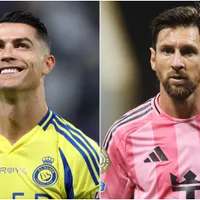The contrasting World Cup fortunes of Frank Lampard and Carlos Tevez have inadvertently re-opened up the debate around the use of video technology at the highest level of the game.
In the space of one day of the World Cup both Frank Lampard and Carlos Tevez were affected by controversial refereeing decisions.
Whilst Frank Lampard was denied a clear goal, Carlos Tevez benefitted from the officials running scared from an accidental stadium wide video replay to add another goal to his World Cup tally. The contrasting results from these two controversial decisions, have led to the roar from the proponents of goal line technology reaching a crescendo over the last few days.
I however urge FIFA and other governing bodies to tread carefully when reacting to the increasing calls for the introduction of technology into football. Whilst attempts to make refereeing decisions as consistent and fair as possible are imperative to the growth of the game, such attempts should only be made when they do not impact upon the fabric of the game.
I believe that the implementation of the rules during a game, should be as free flowing as possible. The game should only be stopped when absolutely necessary, such as when the ball goes out of play or a rule is broken that negatively impacts upon the side affected by the infraction.
The main concern from those against technology in football should be that in order to review decisions using video technology, then invariably the game will need to be stopped.
This would alter the chain of causation within the flow of the game; meaning that should the original decision not to award a goal or award a penalty stand after review, then all future action in the game will be affected.
The opportunity to counter attack and punish an over commitment in attack will be lost, and extra time will begin to run into farcical proportions at the end of games that are full of borderline incidents.
There are many different proposals and options available that could be used to integrate technology into refereeing decisions from purely goal-line technology to full blown video replays, there has been much talk but little real action.
Goal Line Technology
Determining whether a ball is over the goal line during goal line scrambles or when the ball bounces off the bar, is probably the area of the game that technology could be integrated with a limited impact upon the rest of the game.
The technology to accurately map the location of a ball on the pitch using microchip sensors has been created and trialled successfully during the World Club Cup in 2007 as illustrated in the video below.
A lower tech version of this goal line technology could be the installation of cameras looking directly down on or across the goal line. Installed within the posts/crossbar these cameras could be used in a live feed and viewed by a dedicated official in the bowels of the stadium who would in real time use a buzzer to indicate to the referee whether the ball has crossed the goal line.
Whilst the latter suggestion from the author is untested it is clear that there is scope for the introduction of goal line technology that is not obtrusive on the game.
Video Replays During Games
The piecemeal usage of video replays within football is where there is the greatest risk of negatively impacting upon the game.
The key issues around the use of technologies utilised in other sports are; which incidents are eligible for video review, what triggers such reviews and what happens to the game if the ball is still technically in play. Realistically only incidents which could result in goals being allowed/disallowed or players being sent off could be reviewed, whilst maintaining any semblance of flow within the game.
If only key incidents are to be reviewed and therefore avoiding an American Football style stop/start game, then the next road block to the introduction of video technology is who or what can trigger a video review.
One potential scenario could include a tennis style ‘challenge’ system, in which each captain has a limited number of challenges available during a game. Such a system could in theory work however there is a danger that these could become tactical, with sides using challenges to stop the game and prevent counter attacks and waste time.
This could be particularly controversial towards the end of games, as teams over commit themselves going forward in search of a winning goal or equaliser, and use a counter attack to prevent the other team punishing them on the break.
A counter balance to this could be that the game cannot be stopped and challenges made once the ball goes out of play. However the complexity of the situation is what happens if another game changing activity occurs between the first incident and the ball going out of play.
For example if there was a borderline penalty decision that was not given and the other team broke and scored, what would happen if the other team challenged the original penalty decision successfully? I doubt the game be able to survive the fallout from a high profile incident where the game was brought back after a team had scored a legitimate goal in the interlude.
The other potential scenario is that replays are only used when the referee and their assistants believe that they did not have a clear enough view of a controversial incident to make the call. In this instance the game could be stopped and a decision made.
When this review is complete the referee can decide to give a drop ball or award a goal kick etc, as necessary.
Overall am unsure that live video replays to review decisions have a place in modern football, the inherent risk that any change will impact upon the game negatively, stifling the pace and reducing the game that we love into an American Football style technical battle.
Without its pace and unpredictable swings in the balance of action, football loses an element of its appeal and beauty. This crushing negative clearly outweighs the benefit of eliminating refereeing errors in the game.
Retrospective Video Reviews
If the idea of instant video reviews can be dismissed as unworkable, then maybe there is room for compromise by using technology to punish those who go against the rules and ‘spirit of the game’ with retrospective action based on video evidence.
This could be used to review instances of violence, diving or other instances of blatant cheating, playacting or tomfoolery. Whether these incidents are game changing or not, an independent panel could be used to review and punish such acts, with the aim of discouraging the diving and playacting that plagues the game.
The Future of Technology In Football
As in other sports the route to technological harmony is not clear, any potentially viable suggestions should be thoroughly trialled before being introduced into the professional game at any level.
The custodians of our game have threatened/tried to tinker with the game before, often with disastrous results; this mistake cannot be made with technology.
Hopefully one day an accommodation between technology and refereeing can be found that benefits the integrity of the game, but until that day I hope that the authorities will tread carefully when tinkering with the fabric of our game.
Follow this Writer on Facebook
For the Latest World Cup News Download the EPL Talk Toolbar














